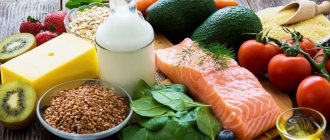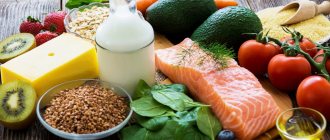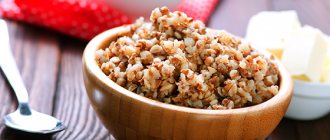How to diet?
So, the whole point of the diet comes down to completely abstaining from any food after 15.00.
In the first half of the day you can eat whatever you want. This is explained by the fact that the human body is able to spend absolutely all the calories received in the morning during the day. But is this really so? Of course, this question cannot be answered so unambiguously, because the process of calorie consumption depends on many factors: the level of physical activity performed, the characteristics of metabolic and digestive processes, etc.
This diet should be taken with particular caution by those who have any problems with the stomach, blood pressure, metabolism, or immune system. Following such a strict diet can cause irreparable harm to your health in these cases! To justify such precautions, let's take a closer look at the dangers of not eating after 3 p.m.
To justify such precautions, let's take a closer look at the dangers of not eating after 3 p.m.
What is the danger of not eating after 3 o'clock?
For example, if you spend the whole day at work and return home only late in the evening, then you will simply exhaust your body, since a cup of coffee in the morning and a few unhealthy snacks at work cannot be called a healthy diet. And most likely, you will not have the opportunity to have a full lunch, since a standard working day lasts at least until 5 pm.
As a result, you will either start starving or eat sandwiches and fast food in order to at least fill your daily diet with something. Of course, such a menu will not benefit you, because instead of receiving the required portion of proteins, fiber and vitamins, your body will receive harmful fats, simple carbohydrates and carcinogens.
Any dietary course aimed at weight loss has one goal: to teach the human body to receive only everything it needs, avoiding excess calories. That is why professional nutritionists recommend refraining from such courses, and simply eating as often as possible, but in very moderate portions. Ideally, you should eat small meals 5-6 times a day.
Of course, if you want to achieve good results in losing weight without harming your body, it is important to choose healthy and low-calorie foods. With fractional meals, you will not feel hungry throughout the day, and your stomach will gradually begin to shrink, since its walls will not be stretched by large volumes of food
What happens if you eat randomly and any food until 3 o’clock in the afternoon, and completely give up any food in the afternoon? With this type of eating pattern, you'll likely be eating a lot of things to try to keep you full throughout the day. Thus, your breakfasts and lunches will definitely be more filling than before. This will cause the stomach walls to stretch more and more every day, which means you will need more and more food to feel full.
The body will begin to understand that it receives food with some interruptions. As a result, he will turn on the so-called defensive reaction - he will begin to put everything he receives into reserve. And such reserves will be reflected directly on your waist, hips and sides.
This diet will also have a negative impact on the metabolic process. He will be completely confused, because a healthy body needs to receive calories gradually - exactly as it spends them. Since it will be difficult for the metabolism to cope with excess amounts of food, violations clearly cannot be avoided.
To summarize, we can only say that a diet based on refusing any food after 3 hours finds its audience for completely unknown reasons.
Often, such methods of dealing with extra pounds are resorted to by those who pursue the goal of saying goodbye to excess weight as quickly as possible. But whether their expectations will be justified and whether this will not have a negative impact on their health is a very controversial issue.
Feeding children up to one year old
Pediatrician d/p No. 4 Knyazeva Galina Viktorovna
The first year of a child’s life is perhaps the most important and eventful. During this time, the baby not only grows (on average, a child’s weight triples by year, and body length increases by one and a half times), he masters the basic skills necessary for later life: learns to move (sit, crawl, walk), communicate (smile, laugh, walk, talk), play, becomes more independent and self-reliant. Proper balanced nutrition for a child up to one year is of the same exceptional importance as parental love and care.
At the same time, questions most often arise related to compliance with the diet of a child up to one year old, because at this age it changes significantly several times! Let's consider the main options for the diet of children under one year old, allowing you to avoid possible problems and preserve breastfeeding as much as possible.
Nutrition for a child up to one year: from birth to 4 months
This is the time when the baby receives all the necessary nutrients, vitamins and microelements from breast milk or adapted milk formula. The benefits of exclusive breastfeeding during this period are obvious and proven by many scientific studies. But, if for some reason full feeding with mother’s milk is impossible, the use of modern adapted milk formulas will also allow the child to develop and grow properly.
The ideal feeding regimen for a baby in the first month of life while breastfeeding is feeding on demand, that is, according to the child’s needs, at least 8 times a day without a night break (up to a maximum of 12–16 times). Indicators of a sufficient amount of milk are the baby’s presence of at least 6-7 urinations per day, regular bowel movements, and weight gain. When artificial or mixed feeding, it is important to maintain a three-hour break between feedings to avoid overfeeding.
From the second to the fourth month of life, children who are exclusively breastfed gradually establish the child's feeding schedule themselves, with breaks between feedings of 3–3.5 hours. The feeding reflex in children of this age is just beginning to form, so breastfeeding strictly by the clock is not advisable. If the baby is sleeping when, according to the mother’s calculations, it is already time for the next feeding, you should not wake him up (except in rare cases of significant underweight when the mother has insufficient milk). And, conversely, if the baby is prematurely restless, it can be assumed that he did not eat the required amount of milk the previous time and by crying expresses precisely the feeling of hunger. This means that you need to put the baby to the breast without waiting for the conditional time. Fluctuations between meal times on free feeding within 1–1.5 hours are quite acceptable.
A night break in feeding is extremely undesirable until the baby is 6 months old, since it is at night that the most prolactin (the hormone responsible for milk production) is produced, and, accordingly, ideal conditions are created for successful and long-term breastfeeding. If, nevertheless, the child himself “wakes up” during the night feeding, this break should not exceed 5–6 hours.
When artificial feeding, due to the greater protein load on the child’s body, it is necessary to maintain feeding intervals of 3.5–4 hours, with a night break of 6 hours.
In a child of 4–5 months, a breastfeeding schedule is usually established after 4 hours, sometimes a night break of up to 5–6 hours is possible. On artificial feeding, the baby is fed 5 times a day every 4 hours with a night break of 6–7 hours.
Nutrition for a child up to one year: from 4 months to one year
From the 4th month of life, doctors recommend introducing the first complementary foods to some children. However, according to the recommendations of WHO and the Ministry of Health of the Russian Federation, the optimal period for introducing new products for breastfed babies is 6 months. At this time, the reflex of pushing out solid food with the tongue fades, digestive enzymes and local factors of intestinal immune defense are activated. We do not recommend introducing complementary foods before 5–6 months, as this can lead to allergization of the baby’s body, disruption of the gastrointestinal tract, and the appearance and consolidation of a negative reaction to feeding.
The general rules are as follows: each new product is given gradually, starting with 1-2 teaspoons once a day. It is advisable to introduce the child to a new type of complementary food in the morning. In this case, the mother has the opportunity to observe the child’s reaction to him throughout the day. This is especially true for children prone to allergies. After getting used to the new product, it can be given either during one of the daytime feedings, when the baby is active, or in the evening, when the amount of milk produced by the mother naturally decreases.
It is important to remember that complementary feeding is just additional nutrition for a child up to one year old; it should not replace or displace breast milk! Complementary feeding is intended to meet the baby's increasing needs for energy, vitamins and microelements, and not to reduce the number of breastfeeding, as some pediatricians still mistakenly believe.
Approximate diet for a 6 month old baby:
- 6:00 – Breast milk or formula 180–200 ml.
- 10:00 – Porridge with breast milk or formula 150–180 ml.
- 14:00 – Vegetable puree 100–150 g, breast milk (formula) 50–100 ml.
- 18:00 – Breast milk or formula 180–200 ml.
- 22:00 – Breast milk or formula 180–200 ml.
When breastfeeding, the night break is set depending on the baby's needs and is still not very beneficial for lactation.
Starting from the 7th month of a child’s life, meat can be added to his diet. Meat complementary foods are introduced into daily feeding along with vegetables, gradually, up to 50 g per day. After meat, cottage cheese is introduced into the baby’s menu. It is recommended to gradually increase the volume of cottage cheese to 50 g per day during the week, in the evening feeding.
Approximate diet for a 7 month old baby:
- 6:00 – Breast milk or formula 180–200 ml.
- 10:00 – Porridge with breast milk or formula 150–180 ml.
- 14:00 – Vegetable puree 150 g + meat puree 50 g.
- 18:00 – Cottage cheese 50 g + breast milk or formula 150 ml.
- 22:00 – Breast milk or formula 180–200 ml.
Breast milk should still make up the majority of the diet for a 7 month old baby. Attachment to the breast should end any feeding of solid food. If your baby is not so willing to breastfeed during the day, you can try giving him complementary foods only after breastfeeding or feeding him more often at night.
The volume of motor and mental activity of an 8-month-old child is already quite large, and he needs all new nutritional components for full development. At this time, the yolk of a chicken or quail egg is introduced; it is added to the porridge 3 times a week. There is an introduction to fermented milk products (kefir, yogurt). Babies who are still breastfed on demand often refuse additional fluids. It's not scary, the mother just has to give the child the opportunity to choose.
Approximate diet for an 8 month old baby:
- 6:00 – Breast milk or formula 180–200 ml.
- 10:00 – Porridge with breast milk or formula 150–180 ml, 1/2 yolk.
- 14:00 – Vegetable puree 150 g + meat puree 50 g.
- 18:00 – Kefir 150 ml + cottage cheese 50 g.
- 22:00 – Breast milk or formula 180–200 ml.
After the 9th month of the baby’s life, the introduction of new products occurs at a faster pace. The child can already chew small pieces of food and is actively learning to eat independently. Its menu is becoming more and more diverse. It is recommended to feed the baby 5 times a day every 4–4.5 hours. It is important that during this period the main liquid that the baby receives remains breast milk. To maintain breastfeeding, it is necessary to take into account the wishes of the child and continue to attach him to the breast during the day and, if required, at night.
Thus, if parents follow these recommendations, by the age of one year the child gets used to a certain feeding regimen, which has a beneficial effect on the condition and functioning of his gastrointestinal tract, immune defense, and health in general. The baby sincerely considers feeding an interesting and useful activity, showing the first signs of independence and self-organization. At the same time, he receives almost all types of products necessary for full growth and development, and significantly expands the range of his taste sensations.
Currently, most experts recommend continuing to breastfeed your baby until at least one and a half years old, which is a good prevention of infectious and allergic diseases, creates a feeling of security and close contact with the mother in the child, and increases stress resistance.
Diet: do not eat after 15:00
It all started when my husband stopped seeing me as a woman. And one day he brought a videotape in which the heroine lost 60 kg. And I decided: it’s time to take care of myself. I really wanted my husband to be able to hold me in his arms on my birthday, which will be in the summer.
I started by buying a swimsuit two sizes smaller and promising myself that this is what I would wear in the summer while on vacation. My weight at that time was 89.8 kg.
In November I went on a diet. Before that I tried teas, didn’t eat after 18.00 - nothing helped. The diet is simple - don’t eat after three: I had breakfast, lunch and dinner until 15.00. At 19.00 I drank a glass of 1% kefir. This went on for a week. The body gradually got used to this routine.
The first three kilograms went away quickly in just a week. I stopped drinking kefir in the evening, switched to green tea and lost another 5 kg in a month. Not much, but it was progress, I was literally flying with joy. Skirts and trousers that had never been buttoned before became just right, and I was already imagining how I would sew them in.
New Year was ahead, which was very scary, because... There are a lot of delicious things on the table at home and away. As if by order, recipes for reducing the calorie content of our favorite New Year's dishes began to appear in magazines. Olivier dressed it with the lightest mayonnaise, bought brut champagne - less calorie.
Important!
The holidays passed without any weight loss for me, but I didn’t gain a single gram. Then the weight began to come off not as easily and quickly as I would like. It happened that in a couple of days I didn’t lose anything, but then I lost 500 g. And so in January I lost another 3.5 kg.
Read How to lose 15 kilograms?
As a result, in two months I lost 8.5 kg. But this is just the beginning. I set a goal for myself - to lose 25 kg, I have 17 left. But now I can wear a dress to the theater without being constrained by a corset.
Yes, by the way, physical exercise is important in losing weight, because after losing a fair amount of kilograms, the skin becomes saggy and completely loses its elasticity. Fitness in the Southern Administrative District helped me cope with this problem. In three months I managed to remove sagging skin on my arms and thighs. The stomach, of course, is still a problem, but I’m not discouraged. The main thing is that I lost weight, and my skin tightened over time.
Note: Are you having trouble sleeping? Read on to learn more about the causes and methods of getting rid of this problem...
Diet Do not eat after 16-00 - reviews
Flash2018
https://otzovik.com/review_8542510.html
Advantages:
It works quickly and cleanses the body.
Flaws:
Not suitable for everyone
Good day to all. I would also like to leave my review about the diet, if you can call it that, “don’t eat after 4 p.m.” I would like to point out right away that if someone has health problems, then it is not worth the risk. Or at least refuse to eat after 18.00 or 19.00. Because not eating after 16.00 is not good. Especially if your health is poor. Well, okay, I’m writing about myself. Let me start with the fact that I have great willpower)). You can be envious. Therefore, it is not difficult for me to follow dietary regimes and deny myself something. Everyone has already heard about losing weight if you don’t eat after 18.00. But I decided to reduce the time for myself. I haven’t eaten after 4 p.m. for about a month. During this time I lost 6,300 kg. This is just great for me. Because I had to lose 8-9 kg. After a month I continued to follow this regimen for some time. And it turned out to be 9kg. Until 16.00 I ate absolutely EVERYTHING. But after that, keep your mouth shut. Once you have achieved your result, you should not immediately gorge yourself. Otherwise it will all be in vain. To be honest, I still don’t eat enough at night. I can eat at 20.00, but that’s if I know that I’ll go to bed late today. In short, in 1.5 months I lost 9 kg. Over time, soon, 1 kg returned. And so it stayed with me))). But in principle it doesn’t bother me. I'm already satisfied with my results. I even fit into the things I wore before giving birth. Not which I even wear)))). Therefore, I 100% recommend this type of weight loss if you are confident in your health. Good luck with losing those kilos, girls!!!
tupozver
https://otzovik.com/review_6913839.html
Advantages:
efficient, you can eat whatever you want
Flaws:
not permanently
Good day to everyone losing weight! We all want to look great. Have a toned figure, without sides and thighs, like broilers. Especially for summer. Therefore, we try different diets and want it to be simpler, but for better results. And here is one of the most popular diets for weight loss, especially among people not to eat after 18:00 or, in this case, after 16:00. This is indeed a very effective diet that helps you lose weight in most cases. By the way, it is essentially intermittent fasting. And it, in turn, is generally the most effective in my opinion. Basically, the idea is that you eat whatever you want, but stop eating after a certain hour and thus you eat fewer calories, and the entire time you don't eat, you live and burn your fat. Everything is ingenious and simple. But the problem with this diet is that you won't last more than two weeks. And if you hold out, then after you leave it, you will begin to eat and gain more. There is a big chance to gain even more than before. And it’s not just a matter of willpower or anything else. The point is that if you want to lose weight, then change your life in general, your way of thinking about food and activity during the day. That is, you don’t have to eat first, and then sit down and wait until it all turns into fat. You must definitely move, squat, and walk. In general, if you need to lose weight purely for the summer, and then you don’t care about your appearance, then the diet is suitable. But for this you need to have really strong willpower. If you want to lose weight and stay in shape. Then change your life and look for less drastic ways to lose weight.
Diet “Don’t eat after 15”
Water, green tea, kefir. Or better yet, just water. The results are simply colossal. I wouldn't have believed it if I hadn't seen it myself.
And about the harm and about gastritis.. The fact that we eat fast food, chips, drink beer, etc. Is this not the cause of gastritis? Yes, even ordinary products from the supermarket, do you read their ingredients? Yes, there is a lot of chemistry there, even vegetables and fruits, and those on the shelves are getting worse and worse every year.
And fasting... Zhanna Friske even said in one of the programs that she arranged for herself from 7 to 15 days of fasting.
Water and green tea. Supposedly it helps the body and is considered very useful.
Of course, you should consult your doctor before doing this. Melt water is very useful for the body, fasting days include fruit, vegetables, drinking, and cereals, a huge amount of them. You need an incentive and everything will work out. I haven’t eaten after 14 for two months. My weight went up to But I also excluded sweets, flour, fatty, smoked foods. And I won’t stop there. There are no side effects, my health is good.
It is advisable to take vitamins. But I sometimes forget to drink them. So girls, who want to lose weight, don’t give yourself any slack and everything will work out.
There aren't enough reviews here. I think that this option is very interesting for losing weight and getting healthy. This is not hunger. I want to try, or rather, return to it. Recently I tried to lose weight like this, my tummy goes away well first of all.
I lost 7 kg this way. Then I forgot about the diet altogether. There was no time for that. Now I want to resume. That previous weight did not return, by the way. Although about two months have passed. I lost those 7 kg in two weeks.
Now my weight is 77 kg with my height. I want weight. I still need to lose 20. I choose this diet, I liked it the most, it’s easy to tolerate and the results are excellent. After lunch, drink warm and cool water; you don’t feel like eating at all.
Who's with me? I will come here sometimes and write the results. For those who are afraid of hunger, read about its benefits, girls. If you drink water after lunch, rejuvenation occurs, restoration occurs at the cellular level, diseases and skin are treated, the body really becomes younger, and you feel excellent.
And the kilos come off so easily. This is the most wonderful way to lose excess weight, it’s a pity that I haven’t heard about it before.
I'll be back here on the 13th. I'll see how much I can lose in a month. I eat before Then I drink water. But the secret is different. If such a regime is accepted by the soul, it always bothered me that I need to eat once a day or 6 times little by little, then there will be no problems.
And then in these two meals you can eat whatever your heart desires. I’ll say right away that I have long adhered to the principle of eating fast food as little as possible, only in company, when there is no longer an opportunity to refuse, and I always prefer to cook myself. But I feel incredible lightness. When it gets warmer, I’ll start running. And by the way, I’m so used to it that I don’t feel like eating at all in the evening.
Authorized Products
You're all nervous. Be calm about everything! For some, it’s a retard, but for others, not eating afterwards is a common thing, and the stomach doesn’t complain—it’s used to it. Drink Corvalol! This is what I did: I started eating less. For example, I ate 7 dumplings in the morning and cottage cheese with tea, and then an apple. And at lunchtime and in the evening, too, little by little. And in 15 days 4 kilos escaped!
Children, the truth is hanging out on the surface!
Do not eat after 15.00, will there be any results?
I started eating as usual and within a week everything was back. I'll try again and not interrupt. Hello, I’ve been working out with a trainer for a long time, I lose weight, but if I don’t watch my nutrition, I gain it back up. There will be no harm, the stomach will only thank you for this!! Girls, probably everyone knows about Mirimanova’s “minus 60” diet, she also has a website where nutrition tables are presented - what to eat and when.
My friend after the result in 9 months - 15 kg, without playing sports. At first I didn’t eat after 5, now after 3. My height and weight increased. I have a very hearty breakfast, sweets, a couple of cookies, a saucer of various nuts, low-fat cottage cheese, or a sandwich of Borodino bread with vegetables. At 3 o'clock kefir with berries and cottage cheese! I finished eating, ate a piece of fish and two kiwis, I hope I don’t eat too much, although this is also considered a joint.
Aigul V I finished eating, I ate a piece of fish and two kiwis, I hope I don’t eat too much, although this is also considered a joint. Marina, what kind of a mess is this?! Aigul Well, anyway, did you lose so much weight without sports or with sports? Today I’m going to the gym, I’ve just weighed myself and ate a pie with cabbage. I have no willpower. Marina, you inspired me: I don’t eat anymore after 3, but it’s still very little.. I really really hope that this will help me lose weight.
The page will close automatically after 5 seconds. New for today. Popular today. User of the Woman website. Use and reprinting of printed materials from the woman website. The use of photographic materials is permitted only with the written consent of the site administration. By article. On the forums. Login Register Make a Woman.
Back to topic. Today I also join, I won’t eat after 14. My weight is 78. I don’t eat after 8. I won’t eat after. Last year I lost 6 kg in a month. I’ve been eating this way for 8 months, I was 98 kg and now I’m 68!!! From today I will also stick to it - after an hour and a half has already passed after three o’clock, I don’t feel like eating at all, ugh, ugh.
Girls, don’t disappear, please, I really want to know your results. Reply Add new topic. Leave a comment. Show another. Translate from transliteration
Attention, before sending your message, please read the new rules for publishing topics and messages on the forum.











